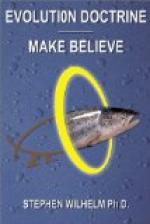to know that in growing up a human infant undergoes
the changes of childhood and adolescence, that kittens
become cats, and that an oak tree is produced by an
acorn, for we know these things directly by observing
them. It is natural for development to take place
under normal conditions, and if it does not, then
something has interfered with nature. Inasmuch
as “growing up” is accomplished by the
alteration of an organic mechanism with one structure
into an individual with a changed plan of body, it
is in essence the actual process of evolution which
the comparative study of grown animals of to-day demonstrates
in the way we have learned. The study of animal
structure discovers the process of evolution because
the most reasonable interpretation of the similarities
and minor differences exhibited everywhere by the various
groups of animals is that descent with adaptive and
divergent modification has taken place; the result
is reached by inference, it is true, but by scientific
and logical inference. With development it is
otherwise. No reasoning is necessary to tell
us that organic transformation is a real and a natural
process. We see it everywhere about us and we
ourselves have come to be what we are by a natural
history of change. Can we consistently deny that
it is possible for a species to alter in the long course
of time when a few brief weeks are sufficient for
the new-laid egg of the fowl to develop into a fledgling?
Many indeed strain at the gnat of the longer process
in the past when without hesitation they recognize
the real and obvious fact of individual development
in a brief period.
I have said that development is a “natural”
process. We employ this word for the familiar
and everyday occurrence or thing; it does not imply
that everything is known about the object or phenomenon,
because science knows that complete and final knowledge
is impossible. We say that it is natural for
rain to fall to the earth, and we speak of the law
of gravitation according to which this takes place
as a natural principle, but it may not have occurred
to many to inquire what makes rain fall and
why do masses of matter everywhere behave toward
one another in the consistent manner described by
the law in question. Sunshine is natural, but
we do not know why light travels as it does
from the sun to the earth, and this is another question
which, like the inquiry into the ultimate cause of
the familiar and natural phenomenon of gravitation,
has not yet been answered. But it is still regarded
as natural for the rain to fall and for the sun to
shine. In the same way does science view development,
denoting it natural because it is an ordinary everyday
matter. And we are under no more obligation to
postulate supernatural control for the changing forms
in the life-history of a chick or a cat than we need
to assume that gravitation and the radiation of light
demand immediate supernatural direction. The
embryology of no form is fully understood or described




